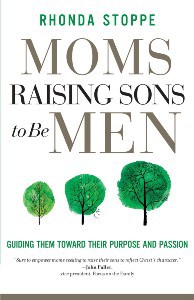John Fuller: Today on Focus on the Family, we’re going to return to an important conversation about moms and their sons. And, uh, here’s part of an original song that one of our guests Brandon Stoppe wrote for his mom Rhonda.
Brandon Stoppe: (singing).
John: Well, that’s Brandon Stoppe with a wonderful tribute to moms everywhere. And this is a Best of edition of Focus on the Family. Brandon and his mother Rhonda joined us earlier this year to describe that special relationship between moms and sons. And because that program was so popular, we’re sharing it again with you today. Uh, your host is Focus president and author Jim Daly, and I’m John Fuller.
Jim Daly: John, I’ve said it before, but it’s worth saying again. Motherhood is one of the hardest and most important jobs in the world. And moms are raising the next generation of godly men and women, and we simply don’t appreciate that enough. And for dads, hopefully you’re engaged and being there for them as well. Eh, that’s why I’m thrilled to repeat this message, uh, from Rhonda Stoppe and her son Brandon. I- if you’re a mom with one or more boys in your family, I think (laughs) this will inspire you. I hope so. That’s the purpose. And if you’re the dad, lean in and see how you can support your wife in this critical role of raising your sons.
John: And Rhonda has written a book about this, uh, very thing, Moms Raising Sons to be Men: Guiding Them Toward Their Purpose and Passion. And we have more details about that and our guests at focusonthefamily.com/broadcast. Here now is part two of our conversation with Rhonda Stoppe and her son Brandon on today’s Best of Focus on the Family.
Jim: We, uh, left last time when we talked about Mary and the awesomeness of Mary accepting the task of, you know (laughs), birthing the Messiah and how she went through that. And if you missed last time, get the download and, uh, or you can get, get the download on your smartphone.
John: Mm-hmm.
Jim: There’s ways to do that, ’cause you really need to hear, uh, part one of this story. But Rhonda described that puzzlement that Mary must have had, and then coming into that reconciliation that, “Okay. I’m going to do this.” And we left off there, talking about how something Brandon would experience impacted you. So let’s pick the story up there, Rhonda. Uh, you’re this person that’s gotten all this wisdom from older women, and then you get a diagnosis with Brandon. What was it?
Rhonda Stoppe: We had just moved to, uh, Austin, Texas, and we ended up planting a church there. And while we were there, Steve was actually still in California. So I was home alone with the kids. And Brandon had a severe seizure. It lasted 28 minutes.
Jim: That was the first time?
Rhonda: The first y-… Didn’t know anything. And h- they Life Flighted him to the hospital. I didn’t even know where the hospital was. But when he got on the air-, the, uh, helicopter, he was talking baby talk. He’d been 28 minutes without oxygen.
Jim: Wow.
Rhonda: So as I finally was driving to the hospital, my prayer was that he wouldn’t have had brain damage. So I get to the hospital. He’s jumping on the bed, “Mom, I was riding on a helicopter.” I’m like, “Yes, buddy. You’re fine.”
Jim: He’s back.
Rhonda: And they did tests. One of the tests they did is an EEG on his little brain. They glue those little things all over his…
Jim: And how old is he?
Rhonda: He was 6.
Jim: Six. Okay.
Rhonda: And during one of the tests, he was asleep. And I went over and I kissed him on his temple, and tech called me over and she circled and she said, “Mom’s kiss.” They know that you kiss them when they’re sleeping. So-
Brandon: I just thought about that the other day, actually.
Rhonda: Yeah. Yeah.
Brandon: Yeah.
Rhonda: ‘Cause you kiss your babies and-
Brandon: Yeah, yeah.
Rhonda: Yeah.
Brandon: Yep.
Rhonda: And, and so when my kids were in junior high, I used to go in and kiss them all the time and be, “Mommy loves you. You love mommy.” (laughs).
Brandon: (laughs).
Rhonda: But the doctor said he had severe seizure activity in his brain. And so our life took on a whole new… Neurologists and medications.
Jim: Right.
Rhonda: And the medication that they had to put Brandon on was so strong. He had to take it three times a day or he would have severe seizures.
Brandon: Yeah.
Rhonda: So all of a sudden, my bright, articulate little boy-
Jim: Mm-hmm.
Rhonda: … was very calm and quiet, didn’t want to play sports. I was coaching high school cheerleading in Texas at the time. Anybody who lives in Texas knows, like, that, what that’s all about. My boy didn’t want to be an athlete. He didn’t want to run one down the field or hit one out of the park or hear the crowd glory in my son’s accomplishments. He played Legos. They put him on special ed at school. And that pierces your heart when the administrator uses those words-
Jim: Mm.
Rhonda: … for your son. And it was a season of just, like, “Lord, are, are you, are you in this? What are you doing?”
Jim: Mm-hmm. Yeah.
Rhonda: And as that time went on, about four years later, um, Brandon had a severe seizure because we missed one dose of his meds. And the doctor said, “Then that means he still has severe seizure activity. So we have to keep giving him the meds.” And that broke me.
Jim: Yeah.
Rhonda: And I went in my room, and I was weeping before the Lord. And I was like, “We are serving you, and there’s teenagers coming to Jesus. And we are serving you. Can’t you heal my son?”
Jim: Mm-hmm.
Rhonda: “I quit. I’m done. I’m out of here.” But if you hide God’s word in your heart, the Bible says you won’t sin against Him. And in the stillness, not an audible voice, the Scripture and everything, “Give thanks, for this is the will of God in Christ Jesus concerning you.” And I didn’t say yes. I said, “I have no idea how to thank you for this, but I will say, “Thank you” with my lips. But you’re going to have to change my heart.” Slowly, we observed that Brandon was becoming a musician. We had praise band practice in our house every Wednesday night after youth group. And he could sit behind the different musicians and he could play.
Jim: Play-
Rhonda: And my husband, who’s a musician, said, “I’ve never met someone at this age that can think in music theory like Brandon does.” So what we started to observe was I wanted to raise an athlete to hear the crowd glory in his accomplishments, but God pushed me out of the way to raise up my son to bring the crowd to glory in God’s son’s accomplishments through worship. Brandon’s a worship pastor, and it’s been amazing to see what God has done.
Jim: Yeah. Let me ask you, Brandon, uh-
Brandon: Yeah.
Jim: … you know, memories of being a six-year-old are often-
Brandon: Mm-hmm.
Jim: … a little elusive.
Brandon: Sure.
Jim: But how did that impact you as a boy? How did you process that? And where are you at today with that diagnosis?
Brandon: You know, um, when I think back at the time, it was… I think I grew up faster than I should’ve in a lot of ways. Um, the, the medicine really put me in a, a, a dark place in a lot of senses, of, a lot of things that I’m even kinda, in, in my life that I have to work through and, and remember the, the truth of who-
Jim: Yeah. It’s important, though, as to why.
Brandon: Yeah.
Jim: Why do you think you went to those dark places?
Brandon: I think the, the difficult thing for me at that time was I was, I wasn’t as smart. I didn’t feel as smart. And so a lot of self-doubt set in.
Jim: Mm.
Brandon: A lot of, uh, not feeling good enough, not feeling like I was smart enough, that was a huge thing for me. And at, like, six or seven, I’m having these thoughts, like-
Jim: Yeah.
Brandon: … like, “I’m stupid,” like, “I’m not smart.” And it was tough.
Jim: Mm-hmm.
Brandon: It was a tough… I, I remember very clearly, like, multiple nights of just e-… For some reason, I, I didn’t want to sleep. It, it… The seizures were linked to sleep. So if I fell asleep, you know, like, that feeling, like, when you’re starting to fall asleep and then you wake up real quick-
Jim: Yeah.
Brandon: … like in a jolt? I would wake up into a seizure.
Jim: Ah.
Brandon: And so I was afraid of falling asleep.
Jim: Mm.
Brandon: And as-
Jim: That’s terrifying.
Brandon: … a seven-year-old, I’d be, you know, awake for hours. I had a clock on my, on my bed, and I’d watch the clock, and it would get up to, you know, 2, 2:00 AM sometimes. And I was just afraid, terrified to go to sleep.
Jim: Right.
Brandon: And I had all these thoughts just, like, r-… So it was a tough… It was a tough season.
Jim: Yeah.
Brandon: And I remember it very clearly. And even though it was, you know, six or seven years old, it was very impactful on my life. And, um, it was, it was difficult for sure. Yeah.
Jim: Yeah. I would think it allows you to relate to the loneliness of teenagers-
Brandon: Mm-hmm.
Jim: … today. I’m thinking of teens particularly who just don’t feel accepted-
Brandon: Yeah.
Jim: … feel lost.
Brandon: Yeah. Yeah.
Jim: They might not have a diagnosis.
Brandon: Yeah.
Jim: Uh, but they’re, they’re living some of that.
Brandon: Yeah, absolutely. And I think the stuff that I, that was kind of cultivating in that time, it, it reared its head in teen years and in adolescent years for sure.
Jim: Yeah. What a tough thing to go through, though.
Brandon: Yeah. And I think that’s why, you know, music, that’s where I found kind of some solitude. I found some solace in music, you know?
Jim: Right.
Brandon: And I, I’d, uh… We’d have, yeah, worship band rehearsal. My dad was the… He was kind of doing all, wearing all the hats. Small church and, uh, he was the youth pastor, but he was also the worship, worship guy. It was just so inspiring. And I think I just found, I found something in those moments. I found, I found a, a, a purpose in a sense.
Jim: Yeah.
Brandon: And, and it was something that I knew I wanted to chase because I could.
Jim: Mm-hmm.
Brandon: And although I was, like, limited in what I could understand and how quickly I could… Uh, music just clicked for me.
Jim: Right.
Brandon: So-
Jim: Well, it’s like you were made for it.
Brandon: Yeah, absolutely.
Jim: I mean, that’s a good way to look at it.
Brandon: Yeah.
Jim: In fact, Rhonda, you wrote in the book about that, this idea of appealing to the man he will become. You’ve kind of given us a little insight there. You had Tony, who you brought into the family, on this path of, you know, high achievement, became a fighter pilot, athlete, I would assume.
Brandon: Mm-hmm.
Rhonda: He flew the F-22. I just have to throw that out there.
Brandon: Yeah.
Jim: Okay (laughs).
Rhonda: (laughs).
Jim: Okay. Good. I don’t know what number we’re up to now.
Rhonda: Best of the best.
Jim: But you could tell you’re a proud mom.
Rhonda: (laughs).
Jim: But that’s a good thing that, uh-
Rhonda: (laughs).
Jim: But to that point, I mean, you had to pull back and you had to do what you wrote in the book, appealing to the man he will become. And so many moms, and certainly dads, if we haven’t said this, dads need to be leaning into this as well.
Brandon: Mm-hmm. Yes.
Jim: But we, we have a vision of what we want our sons and daughters to become.
Brandon: Mm-hmm.
Jim: And you got to let that go…
Rhonda: Mm-hmm.
Jim: … ’cause God’s got a different plan typically for them. How did that, how did that work for you? How did you really appeal to the man that he would become?
Rhonda: You know, I was just listening to the episode that you guys interviewed Dr. Kathy Koch, and she was talking about-
Jim: She’s good.
Rhonda: She was, you know, big, and they put her in dance, and she all of sudden found her place. Her parents listened to her. And wha-… As Brandon, h- he didn-, he wasn’t, he didn’t process his thoughts out loud.
Jim: Yeah.
Rhonda: He was very quiet. And I remember one day he was in fifth grade and he said, “I’m dumb.” And I’m like, “You’re not dumb.” And I… That’s when I took him out of school and homeschooled him. And I took my youngest out of school to homeschool her, ’cause I thought the least I’m going to get out of this is sleeping in (laughs) in the morning.
Brandon: Yeah. Yeah.
Jim: Yeah.
Rhonda: But, but when your child reveals something they’re struggling with, make an adjustment to help them. By the next year, he was getting straight As in sixth grade. And when he was an adolescent, as Brandon said, a lot of these things started coming out at that adolescent age, because men crave respect. And so I always tell moms the first decade of their lives, love the snot out of your little boys, “Mommy love you. Mommy love you.”
Jim: (laughs).
Rhonda: But when they hit that 10, 11, 12, you’ll know when it is. They start smelling funky. They push you away. You have to decide, “I’m going to show them how I love them by how I respect them.” And then they’ll listen to you. So an example that I shared in Moms Raising Sons, Brandon was learning to drive, and so he was driving up our canyon, which is a winding mountain road with cliffs on both sides (laughs). I’m with this moody teenager.
Brandon: (laughs).
Rhonda: And he said, “Why won’t you let me listen to secular music? Why are you and dad so against me listening to secular music?” Honestly didn’t want to have the conversation. It was a… We have a 40-minute drive with no cellphones, no radio, no TVs in the car. You just talk or you don’t. And I’m like, “Okay, Lord. Give me wisdom,” ’cause I knew that he was not going to like the answer.
Brandon: Mm-hmm.
Rhonda: And so I said, “Dude.” That’s his nickname.
Jim: (laughs).
Brandon: And I think I was struggling with it ’cause I think Meredith had, like, some.
Rhonda: Yes.
Jim: (laughs).
Rhonda: Yes.
Brandon: You know? And I was like-
Jim: Okay. Now we’re going to-
Rhonda: His big sister got to listen to some.
Brandon: I was like, like, “Wait, wait. Hold on.” Like (laughs)-
Rhonda: (laughs).
Jim: That’s the standard.
Rhonda: (laughs).
Brandon: Yeah, yeah. Yeah.
Rhonda: Yes. But that’s the point, right? You raise your… Go ahead. You raise your kids for who they are.
Brandon: Yeah, yeah. Yeah, yeah. And so what you said is-
Rhonda: So I said-
Brandon: … was, “Go-
Rhonda: …, “Brandon, here’s the thing. God…” And God e- ended up healing Brandon from epilepsy, which is a beautiful story. But I said, “God brought you through this because He’s put in your heart to be someone that leads people to worship. And the Bible says is, “A man thinks in his heart, so is he?” I know the man you want to become is a man who leads people to worship Christ. But if you feast on secular music, you are going to write secular music. If you feast on the music of the world, that may be where you… You may be famous. You may play for high school dances and nightclubs. I don’t know. But it will be not what God has for you. And I’m here to help you get there. But until you’re ready to guard your own heart, we’re going to help you guard your heart, ’cause you don’t even know that Satan wants to steal, kill, and destroy the good plans that God has for your life. So we’re going to help you set a guard over your heart. But when you’re an adult, you can listen to whatever you want. But right now, we see who you want to become and we’re here to help you get there.
Jim: Yeah. And Brandon, of course that went down silky smooth, right?
Brandon: It was to-
Jim: (laughs).
Brandon: It was tough to… Yeah.
Jim: At the time.
Brandon: Tough to swallow at the time, yeah. But it-
Jim: Now, you realize it. But…
Brandon: It was one of those mo-… There’s a few moments that I can think back were, you know… My, my mom and I, we were, like, butting heads on something. But then she’d say something, and I’d be like, “Ah, that does make sense,” you know? And I think for me, what, what connected is, is she just had such a desire for the things of the Lord to be at the forefront of my heart and my thinking and such a desire to see the Lord just lifted up in my life and in the decisions that I made. And, and music was a big part of that. And I think just her saying, “You know what? I know that the Lord is going to use this part of, of what He’s given you” was important. Um, and to do in a way that, that wasn’t, uh, self-seeking and wasn’t, uh… I, I think secular music, while, uh, for some kids it wouldn’t have been, like, that big of a deal, I think it would have been a big deal for me.
Jim: Well, it was your language.
Brandon: Yeah. Yeah, yeah.
Jim: Yeah. It really was-
Brandon: Yeah.
Jim: … who you were becoming.
Brandon: Yeah.
John: Mm.
Jim: So that was wise.
John: Yeah. This is Focus on the Family with Jim Daly. And today, our guests are Brandon Stoppe and his mom Rhonda Stoppe. And, uh, Rhonda has written a book that we’re covering, uh, bits and pieces of along the way here. It’s called Moms Raising Sons to be Men: Guiding Them Toward Their Purpose and Passion. It’s an excellent resource. We’ll encourage you to stop by focusonthefamily.com/broadcast to get your copy, or give us a call, 800, the letter A, and the word FAMILY.
Jim: Rhonda, you touched on this, but I want to make sure we hit it squarely. Uh, and in fact, in the book, you, you say it this way. You hand your son his manhood. I think for me as a dad, I understand that maybe differently. But I found it, yeah, interesting from a mom’s perspective what your role is in handing your son his manhood.
Rhonda: I think our sons get the impression we want them to stay our little boy forever. And secretly, in our hearts, we do (laughs).
Brandon: (laughs).
Jim: Sometimes on the outside, too.
Rhonda: Yes.
Jim: (laughs).
Brandon: (laughs).
Rhonda: But Brandon and I, when he hit adolescence and he was, like, pushing back, you know, “Go sweep the kitchen floor,” he’d always swept the kitchen floor, now it was beneath him. And I’m seeing it as rebellion in the troop. And having to step back… And, and, you know, I’m, I’m putting this in a nutshell, but there were a lot of tears. There was a lot of interaction. In fact, Brandon and I spoke at a mother-son retreat at Mount Hermon, and Brandon talked to the moms about adolescent boys (laughs). And he said… Do you remember what you said?
Brandon: I don’t remember. Sorry.
Rhonda: Um, “When my, when my mom…”
Jim: And she remembers that (laughs).
Rhonda: Yeah.
Brandon: Oh my God (laughs).
Rhonda: “When I could get my mom to cry, I knew I-
Brandon: Oh, right.
Rhonda: “… was in control.”
Jim: Ooh.
Rhonda: “And when she stopped crying, I knew I had lost control.” And there’s, like, moms, not a dry eye in the room.
Jim: Yeah.
Rhonda: Like, “Ah, that-”
Jim: Mm.
Rhonda: But-
Jim: Uh-huh.
Rhonda: … I was like, you know, “I love this, this boy so deeply, and he is questioning my love for him ’cause I won’t let him go skateboard all over town with his friends.” And you know, you know in your knower that’s not a good decision, but he, all he sees is, “You’re just trying to control me.” But moms, we are the hill to die on. There’s no coming of ritual practice in our culture except don’t be a mama’s boy. So I wish they could just walk on some hot coals, pee on a rock, kill the fatted calf-
Jim: (laughs).
Rhonda: … call him a man, and we’ll call it a day. But there isn’t. But you’re the hill to die on. So either they’re going to fight you to become a man or you’re going to say, “I know you’re a man, and I’m going to defer to you as a man.” So my husband got involved, Steve. And I, you know… He came home one day, and I was in tears. And he goes, “That’s it.”
Jim: It’s time.
Rhonda: “You don’t work for her anymore.” And he looked at me like, “Good, ’cause she’s nuts,” you know?
Jim: (laughs).
Rhonda: And Steve said, “But you work for me, and I’m a much harder task master.” And Steve put a pick and shovel in Brandon’s hands and said, “I want you to dig a ditch,” we live on a ranch, “from the house to the barn. And we’re going to run electrical wire and power over there. Get to work.” The next morning, Steve said, “I’m going to work. When he gets up, you don’t remind him. You don’t nudge him if he chooses not to do it. If there’s consequences to face, I will impose them. You’re out.” And you know, it’s funny, ’cause we want dad to get involved. But then when dad gets involved, we’re like, “Oh, that… Oh, that’s just too much. That… He really had plans with his friends and you just grounded him, and now he can’t go to this camping trip he’s been planning on.” You got to… If you’re going to hand it over to dad, you hand it over to dad. And then, mom, you step back and you let dad be the one. Now, I know there’s moms all over gasping, going, “But you don’t understand. My husband wouldn’t do it that way.” We were in youth ministry for 18 years, and we watched the ones who said, “I am going to defer to my husband’s authority.” And I know we’re talking to single moms, too. And single moms, have your kids in a youth group. My, my son Tony, my husband became his father in the faith because he was at youth group. You want male heroes and influences in your sons’ lives, be a part of a church family. But that was the, the dynamic that changed mine and Brandon’s relationship, when I deferred to Steve’s authority and I stepped out.
Jim: Mm.
Rhonda: And it was not easy. I wanted to protect him from what he was going to get in trouble for when he didn’t do it. But our relationship changed to be more, uh, respect for each other, I think.
Brandon: Mm-hmm.
Jim: I think in-
Brandon: Yeah.
Jim: … in that regard, I mean, we hear from a lot of parents who have a prodigal teenager. You know, they’re at that 15, 16 age range where they’re kind of jumping out of the home, out of the structure. They’ve rebelled against it, what have you. How, how do you, uh, give them advice and addressing some of those bigger issues, you know?
Rhonda: Well, first, I would say my heart is with you. I have friends that are praying for their prodigals. And the best story in Moms Raising Sons for that, there’s two. One is about Saint Augustine, who was a terrible (laughs) rebel, and his mom prayed for him. But another one is the story of Adoniram Judson, who was raised by a Puritan preacher. And, you know, I always say PKs can be okay, ’cause my kids were pastor’s kids. But this kid went away to college and he walked away from his Puritan belief. His friend Jacob Eames turned his heart away from believing in God. He went to New York after he graduated to try to be a playwright. He failed miserably. And one night, he was riding his horse in the darkness and needing a place to stay, and he found a light across. And he went to the light. It was an inn. And he stayed at that inn. The innkeeper said, “I have one room, but the man in the room next door is crying out in pain. In fact, he’s dying. And if you’re okay with that…” And Judson was like, “No bi-… No problem.” All through the night, Adoniram Judson heard this man crying out and began questioning his own rejection of his faith, “What if, what if it were me dying? What if were-
Jim: Mm-hmm.
Rhonda: “… me going to face the Lord?” Somewhere in the night, it got quiet. And he woke up, asked the innkeeper the name of the person who died, and it was Jacob Eames, the very young man that had turned his heart away from Christ.
Jim: Hm.
Rhonda: God devises ways to bring our prodigals home. We don’t rescue them from their bad choices. We don’t, you know, keep letting them come back and bounce in and out of our houses if there’s things that they need to learn out there. The, the father of the prodigal son, I’m sure his heart was broken as he watched the horizon.
Jim: Mm-hmm.
Rhonda: And God created a famine in the land to devastate that young boy to bring him home. So pray for God to bring-
Jim: Mm.
Rhonda: … devise ways to bring your prodigal back, and then don’t manipulate. Pray.
Jim: Uh, Brandon, let’s bring in here right at the end-
Brandon: Yeah.
Jim: … your mom has stressed the importance of that good modeling in terms of, uh, passing on your faith to the next generation. How did you see that lived out in her life, and how are you trying to live that out in your faith with your own kids now?
Brandon: Yeah, absolutely.
Jim: Her grandchildren, w- whom she really loves, by the way.
Rhonda: (laughs).
Brandon: Yeah. Yeah, yeah.
Rhonda: (laughs).
Brandon: You know, I think, uh, we mentioned earlier about, uh, the feeling of the, and the n-, the need to perform. Um, and sometimes, I think just as humans, we love to measure. We love measureables. We love to perform. We love to look good. We love to look the part. And what I really have appreciated about my, my parents and my mother specifically is, um, she was p- transparent. I mean, there was times when she would apologize, you know, for the way that she interacted or, or said, or there was time-… She was working out just even her own parenting and mothering, and, um, there was space for that. And it was really good to see, “Okay. She’s not saying that she has it all together and that she’s totally perfect and you just need to fall in line and do exactly…” It was… Sh-… It… We were working on it together. We were learning together. And I think that’s, like, what’s made our bond even now, like, so huge is, is during those adolescent periods, it was, it was a lot of, like, us figuring it out and us, like, learning each other. And I think there was one specific moment that I just felt so seen and understood by my mom, and I still have it even to this day. And what she did is she sat me down and she wrote out this, like, this graph, and, and she made, like… She made this graph, and it was kind of like this hierarchy type of thing laid out. And she was like…And there was two situations in my life where there was two friends that I was kind of like… I was disengaging from, and I felt kind of like hurt by in a sense or I was, like, frustrated with. And she said, “Okay, Brandon. Here’s what I see. Here’s what I think I understand about how you process things.” And she wrote it all out and she kind of did the hierarchy, and she said, “And what you’ve done is with… In this situation, you’ve disregarded this person because they don’t believe similar things as you. In this situation, you’ve disregarded this person because, uh, you felt, like, betrayed, like your loyalty’s been betrayed.” And she… The way that she just framed it out and she, she showed me kind of… and she processed it with me, I just felt so heard and so understood. And in that moment, I even still think about that, and in my own, like, uh, the way that I process life and the p- way that I interact with different individuals.
Jim: Mm.
Brandon: I think of that graph and I think of my propensity to go in those directions. And just remembering just a moment like that where she took the time to, to work through it with me and to understand me and to hear me and to say, “This is what I’m perceiving and this is what I’m, I think I’m understanding about how you’re processing your relationships” was huge. And I think, um, just her not always having to be perfect and not always h-… like, that was huge for, for me. And in my own parenting, when I’m with my kids, I’m trying to, I’m trying to be transparent in the same way.
Jim: Yeah.
Brandon: And there’s definitely times when, you know, you have to.. You, you, you bring the hammer down and you’re like, “No, this is how it’s going to be.” And, but when you, when you mess up, you go to your kid and say you’re sorry, you know?
Jim: Yeah.
Brandon: And, and you say, “Hey, I messed up here. I’m sorry, son. Uh, I’m sorry, daughter. Can… Let’s, let’s move forward. Let’s move on. I’ll do better next time.” Uh, but that transparency is like a trust builder, I think.
Jim: Absolutely.
Brandon: And I think that’s what was so huge with our relationship and me growing up is-
Jim: Kept the communication open.
Brandon: Yeah. Yeah, totally.
Jim: And you can see that and hear that between you, and that’s one of the beautiful things about your relationship, uh, as we are observing it and hearing both of your hearts.
Brandon: Mm-hmm.
Jim: And this great book, Rhonda. Uh, well done. And a great reminder for moms, uh, to, you know, follow Scripture in how they’re parenting their sons. It’s just a wonderful thing. In fact, you wanted to read something, I think.
Rhonda: Is that okay?
Jim: Yeah.
Rhonda: This is your time in history, mom. In 1950, when missionary Jim Elliot decided to leave the safety of America to take the Gospel to the native people of the Ecuadoran jungle, his parents were fearful for their safety. Confident that his decision was directed by the Lord, Jim wrote in a letter to his parents, “Remember how the psalmist described children? He said they were a heritage from the Lord, that every man should be happy whose quiver was full of them. And what is a quiver full of but arrows? And what are arrows but to shoot? So with the strong arms of prayer, draw the bowstring back and let the arrows fly, all of them straight at the enemy’s host.” Are you, Mom, doing what it takes to prepare the arrows in your quiver? The influence of mothers has shaped nations, trained leaders, nurtured artists, I always cry, encouraged ordinary men to accomplish extraordinary feats. This is your time in history, Mom. This generation needs mothers who will selflessly embrace this blessed calling of motherhood and raise sons and daughters who are courageous and righteous.
Jim: What a powerful way to end. Uh, Rhonda, great book, Moms Raising Sons to be Men. Uh, you’d done it. Brandon, you lived it, so you know what’s true.
Brandon: Yes, sir.
Jim: And it’s great to have both of you on the program. Thanks for being here.
Brandon: Thank you.
Rhonda: Our pleasure.
Jim: Well, that was so good. It’s our hope and prayer that this conversation with Rhonda and Brandon Stoppe, uh, has encouraged your family. And let me say this to all the moms listening. Thank you. We appreciate all you’re doing to raise godly sons and daughters, and Focus is here to stand with you in any way we can. Uh, we certainly recommend Rhonda’s wonderful book to you, and we can send you a copy if you can help us do ministry. Let’s do this together. And for a gift of any amount to Focus on the Family, we’ll send that out as our way of saying, “Thank you.” I really think this resource will empower you to be the best mom you can be. And you may want to get a copy for a friend.
John: Great idea. And our number here is 800, the letter A, and the word FAMILY, 800-232-6459, or stop by focusonthefamily.com/broadcast.
Jim: And let me take a moment to remind everyone that Focus on the Family needs your ongoing support, especially now at the end of the year. Uh, this ministry is listener supported, which means we’re counting on your partnership to help us strengthen marriages, equip parents, like hopefully we’ve done today, and help families grow in their faith. And you may have heard about our matching gift campaign going on right now. Some generous friends of Focus have agreed to match any gift that you send dollar for dollar. So a $50 gift becomes a $100 gift and so on. So please consider a year-end gift to help Focus on the Family meet its budget. And let me say thank you in advance for doing so.
John: Well, uh, once more, you can donate when you call 800, the letter A, and the word FAMILY, or stop by our website focusonthefamily.com/broadcast. Well, next time, Pastor Gary Thomas offers an inspirational message about Christmas and your faith.
Pastor Gary Thomas: The message of Advent is that God is with us and there is no problem in your life bigger than God.



















